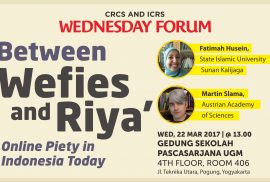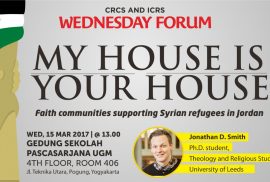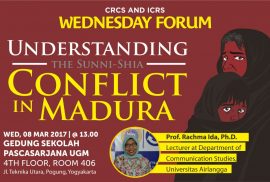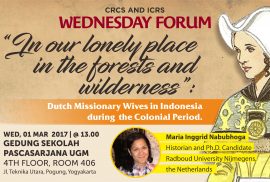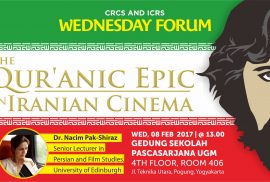
Abstract
The presenters examine popular forms of online piety in Indonesia. They are particularly concerned how Indonesian Muslims try to cope with the ambivalences that their social media practices inevitably generate. These practices range from taking wefies (selfies of a group of people) at religious events that are posted on social media platforms, participating in online Quran reading groups, various form of online da’wah (proselytization) to documenting one’s pilgrimages and meetings with Islamic figures online. Given the importance of visibility that these social media practices entail, the presentation has a special focus on the concept of riya’ (showing off one’s piety) reminding Muslims to avoid that behavior. Arguing that discussions about riya’ have experienced a kind of revival in today’s social media age, the presenters attempt to point out that online piety is inherently ambiguous eliciting a dynamic of discourses and practices that considerably informs the current field of Islam in Indonesia today.
Speaker
Fatimah Husein teaches at the State Islamic University Sunan Kalijaga Yogyakarta. Her latest article entitled “The Revival of Riya’: Displaying Muslim Piety Online in Indonesia” has been submitted for a virtual issue of American Ethnologist.
Martin Slama is a researcher at the Institute for Social Anthropology, Austrian Academy of Sciences. His latest publications include “A Subtle Economy of Time: Social Media and the Transformation of Indonesia’s Islamic Preacher” Economy (Economic Anthropology 4:1, 2017).
Look at the full poster here.
Wednesday Forum News

Abstract
Since 2011, 5 million Syrians have fled civil war in their country. Most of these refugees live in local communities in neighboring countries. Local faith communities and global humanitarian actors regularly work together to provide assistance for Syrian refugees. This talk presents research about Arab and Western Christians providing support for Syrian refugees living in Jordan, based on fieldwork conducted in 2015-16. The talk addresses three questions raised in literature about faith-based organizations working in humanitarian and development projects: 1) Do religious groups approach aid differently from non-religious (secular) organizations?; 2) What is the role of local faith communities in providing humanitarian aid?; 3) How do religious groups providing aid manage religious difference and deal with challenges of proselytization?
Speaker
Jonathan D. Smith is a PhD student in Theology and Religious Studies at the University of Leeds in the United Kingdom. His research focuses on faith-based organizations in the Middle East and their effect on Muslim-Christian relations. He is currently conducting research at CRCS about religion and environmental social movements.
Look at the event’s poster here.

Abstract
Conflict between Sunni and Shia Muslims has taken place in Madura, particularly in Sampang, for many years, triggered typically not in relation to different interpretations of the Islamic faith but rather by clashes between the various personal and political interests of the local religious elites. This study examines the opinions, beliefs, and experiences of the communities of Sunni and Shia adherents in Madura using a communication-cultural studies perspective in order to explore the contestation of meanings of local religious and ethnic identities. This perspective can provide an alternative for unpacking the everyday lives of the Sunni and Shiites and understanding the conflict through their local cultural backgrounds and religious experiences.
Speaker
Prof. Rachma Ida, Ph.D. is a lecturer at the Department of Communication Studies, Faculty of Social and Political Sciences, Universitas Airlangga, Surabaya, and a member of Indonesian Communication Bachelor Association. She earned her Ph.D. from Curtin University of Technology, Australia. Her research interests are in the studies of media and culture, gender studies, and Islam/Muslim identities.
Look at the event’s full poster.

Abstract
Until 1935, the Dutch Protestant mission (zending) in Indonesia was officially run by male missionaries. Women were considered to be supplementary rather than essential actors. Despite the fact that there is only limited information available about them, women were involved in the Dutch Protestant mission from the early nineteenth century. This talk presents a study about the experience and role of Dutch women in the Protestant mission, with particular reference to the existing letters written between 1855 and 1931 by four missionary wives who lived in Sulawesi and North Sumatra. The letters of the four women reveal their domestic and social activities, as well as their perceptions of their role in the mission and the society in which they lived. This talk explores gendered notions in missionary practices and points out the lack of attention to the study of women in Christian missions within the broader framework of Indonesian colonial history.
Speaker
Maria Ingrid Nabubhoga is now a Ph.D. candidate at the Faculty of Philosophy, Theology and Religious Studies at Radboud University Nijmegen, the Netherlands, in the project ‘Indonesia Mirrors’, jointly organized by Radboud University Nijmegen, The Nijmegen Institute for Mission Studies Radboud University and Duta Wacana Christian University (UKDW). Her Ph.D. project explores the perception of contemporary Indonesian immigrants on religion and modernity in the Netherlands, in continuity with the Dutch colonial past in Indonesia.

Abstract:
Urban people are always exposed to soundscape, to sounds and noises in their everyday life. With the aid of technology, the soundscape of Yogyakarta has dramatically changed in the last 30-40 years. The sounds which once gave certain characteristics to the city have changed both quantitatively and qualitatively. For most people it does not bother them if they do not pay attention to them. However, people accept certain sounds as acceptable sounds while some other may reject them as disturbing noises. The result of such perceptions create spsychologically different responses, either positively or negatively. Therefore, exploring how people in the City of Tolerance responding to the religious soundscape of the place where they live is an effort to see an interfaith relationship from a different perspective, the auditory angle.
Speaker:
Jeanny Dhewayani, Ph.D. is the Associate Director of Indonesian Consortium for Religious Studies (ICRS) Yogyakarta.She got her Master degree from University of New Mexico and Ph.D. from Australian National University, both in Anthropology. Now, She is also a professor of anthropology at Duta Wacana Christian University.

Abstract
Iranian cinema is one of the very few in the Muslim world to have employed this new medium in imagining and narrating stories of religious figures. The representation of religious figures in Islam has become particularly controversial in recent years. Therefore, it turned into a highly sensitive undertaking. In this talk I examine the complex socio-political context of Iran to study late emergence of the epic genre in Iranian cinema. In doing so I study the recent creation and development of ‘Qur’anic Films’ within Iranian cinema with specific reference to Kingdom of Solomon (Mulk-i Sulayman-i Nabi, Shahriar Bahrani, 2010), which I argue is the first Qur’anic epic in Iranian cinema if not in the Muslim world.
Speaker
Dr Nacim Pak-Shiraz is the Head of Persian Studies and Senior Lecturer in Persian and Film Studies at the University of Edinburgh. She is the author of Shi’i Islam in Iranian Cinema: Religion and Spirituality in Film (London, 2011) and a number of articles and chapters in the field of Iranian Film Studies. Dr. Pak-Shiraz also regularly collaborates with a number of film festivals, including the Edinburgh International Film Festival and The Edinburgh Iranian Festival.

